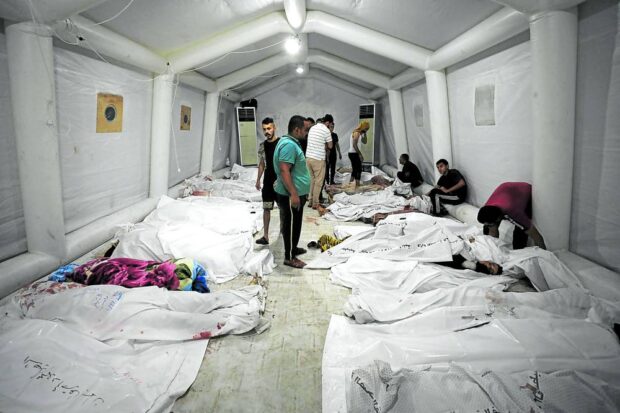
WHOSE HIT? People stand over bodies of Palestinians killed in alleged Israeli airstrikes on Ahli Arab Hospital in central Gaza after they were transported to Al-Shifa Hospital, on Oct. 17. The Israeli Defense Forces, however, said the hospital was hit by a Hamas rocket that misfired. —AFP
GAZA STRIP, Palestinian Territories—A blast ripped through a Gaza hospital killing at least 200 people late Tuesday, sparking global condemnation and violent protests in several Muslim nations.
Israel and Palestinians traded blame for the incident, which an “outraged and deeply saddened” US President Joe Biden denounced while en route to the Middle East.
Hamas authorities in Gaza said the explosion at Ahli Arab Hospital was caused by the latest in a wave of Israeli airstrikes.
Israeli Defense Forces blamed Palestinian militants, saying an outgoing Islamic Jihad rocket misfired.
Neither account could be independently corroborated.
On the ground, there were scenes of chaos as the injured and dead were taken to nearby medical centers. There, scores of bodies cloaked in blood-stained sheets and white plastic wrap lined the floors. Stunned relatives tried to identify loved ones.
“We were operating in the hospital. There was a strong explosion and the ceiling fell on the operating room,” said Ghassan Abu Sittah, a doctor with the medical charity Doctors Without Borders (MSF).
“Hospitals are not a target,” he said. “This bloodshed must stop. Enough is enough.”
For 11 days, Israel has launched withering strikes on Hamas-controlled Gaza—retaliation for the killing of 1,400 Israelis who were shot, mutilated and burned in Oct. 7 cross-border raids.
Int’l condemnation
Even amid the uncertainty over what caused the incident at the Christian-run hospital, there was rapid and widespread international condemnation.“The responsibility for this crime must be clearly established & the perpetrators held accountable” said EU foreign policy chief Josep Borrell.
From Tripoli to Tehran there was a furious response across the Muslim world.Protestors in Jordan—home to millions of Palestinian refugees—tried to storm the Israeli Embassy.
In Lebanon, demonstrators clashed with security forces outside the US Embassy. Stones were hurled and a building set on fire.
Hezbollah, Lebanon’s powerful Iran-backed armed militant group and political party, called for a “day of rage.”
Biden visit
The horror of events at Ahli Arab Hospital and the swift backlash had threatened to derail Biden’s high-stakes visit to the Middle East, which got under way Wednesday.
A four-way summit in Amman with Palestinian President Mahmud Abbas, Jordanian King Abdullah II and Egypt’s President Abdel Fattah al-Sisi was canceled.
It would be held “when the decision to stop the war and put an end to these massacres has been taken,” said Jordanian Foreign Minister Ayman Safadi.
Landing in Israel, Biden said Washington would provide Tel Aviv with everything it needed to defend itself as it wages war against Hamas.
Biden, who met Prime Minister Benjamin Netanyahu early on Wednesday, said Hamas was worse than Islamic State for its killings of Israeli civilians in the Oct. 8 attack.
He said he was “sad and outraged” by the Ahli Arab Hospital explosion, but added that it seemed the “other team” was responsible, in reference to Palestinian militants.Biden noted that 31 Americans were among the more than 1,300 Israelis killed in Hamas’s Oct. 7 attack.
The White House wants to see steps to minimize the humanitarian impact of Israel’s military response, allowing aid to enter the blockaded Gaza Strip.
International alarm has grown about the devastating impact of the war on Palestinian civilians.
‘Tough questions’
About 3,000 Palestinians have died in the air campaign, according to the Hamas-run health ministry—including several senior figures in the organization.
Entire neighborhoods have been razed and survivors are left with dwindling supplies of food, water and fuel.
Washington also wants to prevent the conflict from spilling over into the West Bank, Lebanon and beyond, and to get answers from Israel about its military plans.
Speaking aboard Air Force One, White House National Security Council spokesperson John Kirby said Biden would ask Netanyahu “tough questions” about his plans for the war.Tens of thousands of Israeli troops have been deployed to the border in preparation for a full-scale ground offensive.
Israel’s Prime Minister Benjamin Netanyahu has vowed to “defeat Hamas”—although the exact military objectives remain unclear.
The attack was the worst in Israel’s 75-year history, carrying painful echoes of past pogroms and undermining faith in the country’s security services.‘Corpses in the streets’
Before Tuesday’s incident, the hospital in northern Gaza had sheltered the wounded and displaced from an intense Israeli bombing campaign.
Israel had warned 1 million residents of northern Gaza to flee south ahead of an expected ground invasion.
The Archbishop of Canterbury Justin Welby represents the Anglican church, which runs Ahli Arab Hospital.
He said the hospital was one of several medical facilities in northern Gaza subject to evacuation orders and that it had already been hit by “Israeli rocket fire” on Oct. 14, injuring four staff.
The United Nations Relief and Works Agency says more than 1 million Palestinians—almost half of Gaza’s population of 2.4 million—have fled their homes.
“There are corpses in the streets. Buildings are crashing down on their inhabitants,” said Jamil Abdullah, a Palestinian-Swede, hoping to flee the blockaded enclave. “The smell of the dead is everywhere.”